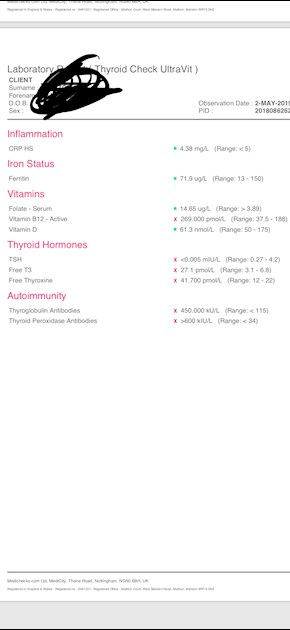Test results
Thyroid test results : Test results - Thyroid UK
Thyroid test results

BorderCollieDex
Your raised antibodies mean that you are positive for autoimmune thyroid disease aka Hashimoto's which is where the thyroid is attacked and gradually destroyed. Fluctuations in symptoms and test results are common with Hashi's. You can swing from hypo to hyper and back to hypo. Hashi's tends to start with a "hyper phase".
When the thyroid is attacked, the dying cells release a lot of thyroid hormone into the blood and this can cause TSH to become suppressed and Free T4 and Free T3 to be very high or over range. These are called 'Hashi's swings'. You may get symptoms of being overmedicated (hyper type symptoms) to go along with these results. The hyper swings are temporary, and eventually things go back to normal. Test results settle back down and hypo symptoms may return.
If you were on thyroid meds these can be adjusted slightly at these times if necessary, but will need readjusting when hypo symptoms return.
You are currently in a "hyper swing" of Hashi's.
You should take these results to your GP and s/he may diagnose overactive thyroid, don't accept this diagnosis because you may be prescribed Carbimazole which is for Graves/overactive. What you have is a hyper phase of Hashi's. If your GP insists it's overactive, then ask for the following antibody tests:
Thyroid stimulating immunoglobulin - TSI
Thyroid stimulating hormone receptor antibody - TRAb
They are the tests for Graves/overactive. If they are positive then you may have both Graves and Hashi's which can happen but quite rare. Don't accept Carbimazole unless positive for TSI/TRAb. Ask to see a thyroid specialist before you do, even then most are diabetes specialists and often wrongly diagnose Hashi's as Graves.
You can possibly help reduce the antibodies by adopting a strict gluten free diet which has helped many members here, although there is no guarantee.
Gluten contains gliadin (a protein) which is thought to trigger autoimmune attacks so eliminating gluten can help reduce these attacks.
You don't need to be gluten sensitive or have Coeliac disease for a gluten free diet to help.
Gluten/thyroid connection: chriskresser.com/the-gluten...
stopthethyroidmadness.com/h...
stopthethyroidmadness.com/h...
hypothyroidmom.com/hashimot...
thyroiduk.org.uk/tuk/about_...
Supplementing with selenium l-selenomethionine 200mcg daily can also help reduce the antibodies, as can keeping TSH suppressed.
Your nutrient levels aren't as bad as one might expect when Hashi's is present, as Hashi's can cause low levels or deficiencies.
I can't explain your high B12 but I see you've asked about that here and onthe PA forum.
Folate is OK.
Ferritin is OK.
Vit D at 61.? nmol/L (24ng/ml) could be better. The Vit D Council recommends a level of 125nmol/L (50ng/ml) and the Vit D Society recommends a level of 100-150nmol/L (40-60ng/ml).
To achieve the recommended level from your current level, the Vit D Council suggests supplementing with 3,700iu D3 daily (nearest is 4,000iu).
vitamindcouncil.org/i-teste...
As you have Hashi's, an oral spray (eg BetterYou) or sublingual liquid (eg Vitabay Organics or Natures Answer) are recommended as they bypass the stomach so will give better absorption.
Retest in 3 months.
When you've reached the recommended dose, then you'll need a maintenance dose to keep it there, which may be 2000iu daily, maybe more or less, maybe less in summer than winter, it's trial and error so it's recommended to retest once or twice a year to keep within the recommended range. You can do this with a private fingerprick blood spot test with an NHS lab which offers this test to the general public:
There are important cofactors needed when taking D3 as recommended by the Vit D Council -
vitamindcouncil.org/about-v...
D3 aids absorption of calcium from food and K2-MK7 directs the calcium to bones and teeth where it is needed and away from arteries and soft tissues where it can be deposited and cause problems such as hardening of the arteries, kidney stones, etc.
D3 and K2 are fat soluble so should be taken with the fattiest meal of the day, D3 four hours away from thyroid meds if taking tablets/capsules/softgels, no necessity if using an oral spray
Magnesium helps D3 to work. We need Magnesium so that the body utilises D3, it's required to convert Vit D into it's active form. So it's important we ensure we take magnesium when supplementing with D3.
Magnesium comes in different forms, check to see which would suit you best and as it's calming it's best taken in the evening, four hours away from thyroid meds if taking tablets/capsules, no necessity if using topical forms of magnesium.
naturalnews.com/046401_magn...
Check out the other cofactors too (some of which can be obtained from food).
 ).
).